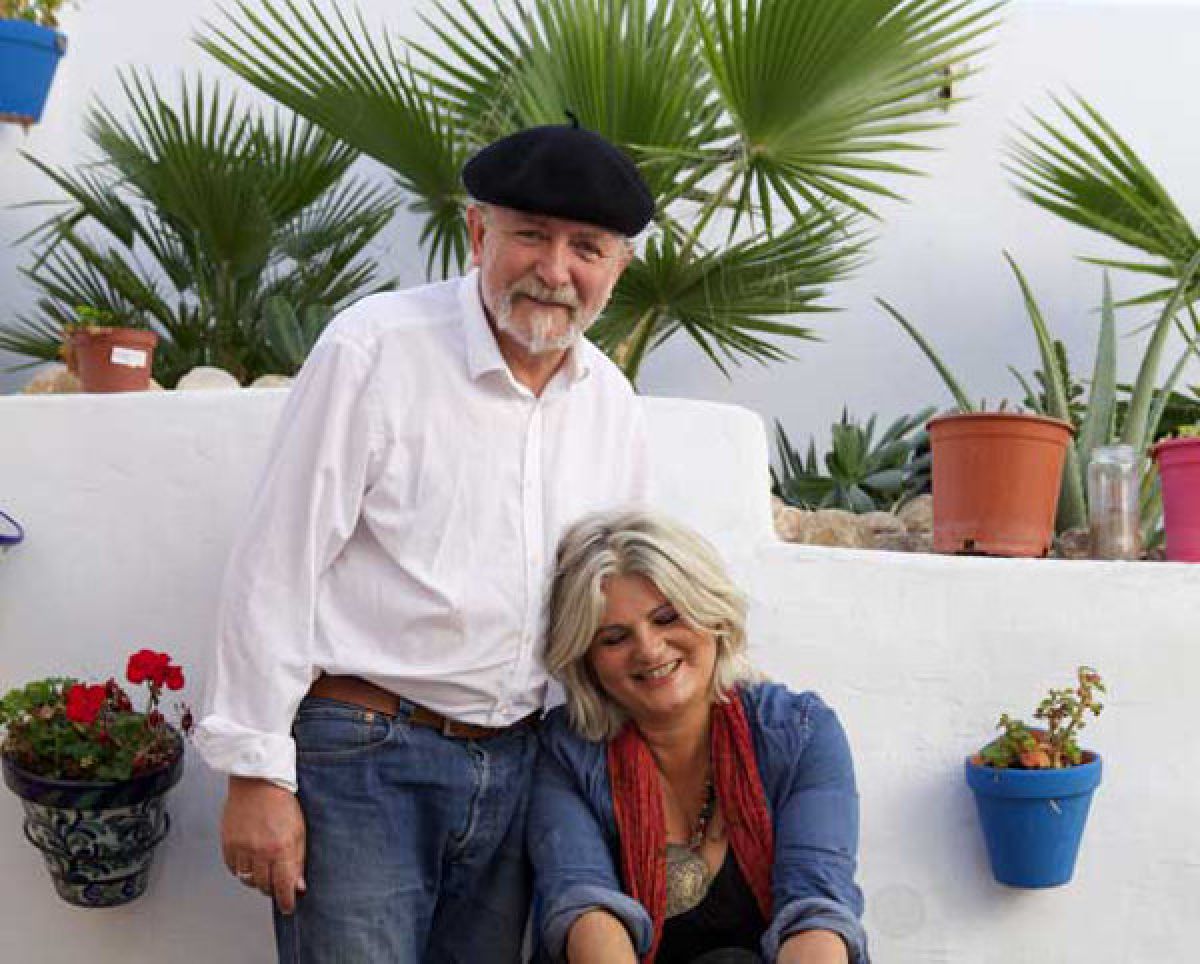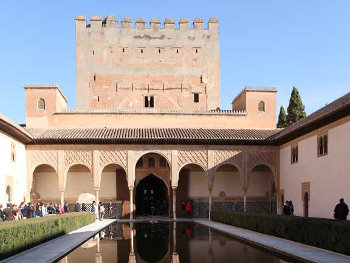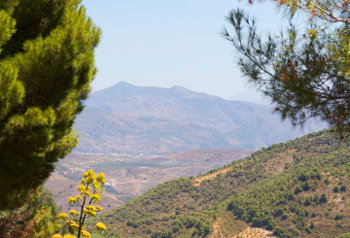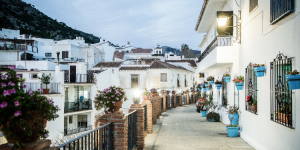
Where are you from, Lottie, and what are you doing nowadays?
I'm an adventurer. I've lived and worked in many places but I was born in London and raised in Suffolk. My primary job has been as mother to my five children. I have also had gainful employment as a nurse, in real estate, managing a bookshop, as a shepherdess, and most recently as sales agent for some of the UK's leading greetings card companies. Since moving to Spain from Indonesia, I've embraced not having to go out to work and enjoy spending my time (when I'm not involved with property renovation) painting, drawing and printmaking.
Why did you choose to expatriate to Spain?
Spain chose us! We didn't intend on moving to Spain but somehow it happened. Shortly before Pete's work contract in Jakarta came to an end, we realized that we needed to make up our minds whether we wanted to stay in Indonesia (we had a house in Bali) or relocate back to Europe to be closer to our families and friends. With no jobs waiting for us back in the UK, we couldn't afford to move back there. So our original plan was to relocate in Portugal. However, during a week long search, we discovered that property there (in the area that we liked) was rather too expensive for our budget. A friend suggested that we try Spain for cheaper property. So this is how we've ended up on the side of a mountain in the middle of nowhere. It's a long story, but in a nutshell, I had just two days to find a house. I'd flown from Jakarta with my wish list of properties to view and a rather miserable budget. Fortunately, I found this house that we are currently living in on the morning of Day 2. It ticked almost all the boxes of what we needed and were looking for. The fact that it had no bathroom, no hot water and no kitchen was something that I kept from my husband until the day of our arrival. Apart from a couple of short week-end visits to Spain years ago, I had no real experience of Spain before we moved here. It was a pretty bold decision to relocate here straight from Indonesia, but fate played its hand and now I can't imagine being anywhere else.

As a British national, what where the procedures you had to follow to move there?
Fortunately, as UK passport holders and EU members, it wasn't difficult for us. Setting up a bank account was as easy as was purchasing the property and finding a good solicitor. Shortly after our arrival, we enrolled at the town hall and received what is known as a Padron. This basically means that you are on the electoral roll. The first thing you need to do before you start anything is get an NIE number. Your NIE is very important. Without it, you can't do anything official. Within a year of being here, we jumped through all the necessary hoops to get our residencies sorted out. There is a certain amount of paperwork that needs to be done if you are going to live here permanently, but while the UK is part of the European community, it is fairly straightforward. I still have a few things to take care of, like changing my British driver's license to a Spanish one.
How long have you been in the country?
We are now embarking on our third year.
What has attracted you to Granada?
It is the most beautiful city, full of wonderful architecture, shops, restaurants and rich with culture and life! The Alhambra really has to be seen to be believed. It is jaw-droppingly beautiful. Each time I visit, I'm amazed at the work and passion that went in to making it and the history behind it. The perfectly laid out Generalife gardens are an absolute treat too. Make sure to book your tickets well in advance. From March right through to November, it gets very busy.
What has surprised you the most at your arrival?
The extra-ordinary friendliness of the locals. I wasn't expecting such generosity and kindness from the villagers. We were bombarded with parcels of fruits, vegetables and even the odd rabbit or two. Our Spanish neighbors took us under their wings and lent us a cooker, a log stove and we had endless invitations to lunch at their house and family gatherings. It was a leg up into village life that neither of us were expecting and it was a lovely surprise, especially as the early months were hard work with building work going on around us and rubble up to our armpits.
Is it difficult to find accommodation there? What are the types of accommodation which are available there?
We chose not to rent first. As I mentioned above, it was a speedy decision to buy something and start making a home here. Spain has really suffered during this last economic recession and property is very cheap to buy and rent. The property market is awash with houses, many of them repossessed by the banks. It just depends on your budget and where you want to live.
Is it easy for an expat to find a job there?
Pete is retired from teaching and I gave up my sales agency when we moved to Indonesia. We are currently both living off his teacher's pension. Great though it is not having to go out to work, we both need to make some extra income. Our plan has always been to run residential art and printmaking courses and also have a Bed and Breakfast. With this in mind, we bought another property in Alcala La Real at the start of the year. Gluttons for punishment, we now have a five-bedroom dilapidated property that needs total refurbishment and outside landscaping. It's taken months to get planning permission and dot all the I's and cross the t's, but we are finally on course to open up at the start of May 2016. Hopefully, once we get the project running, it will enable us to make some much needed extra income and also give us a chance to show off this beautiful part of Spain. I would never recommend for anyone to move here from abroad and expect to get employment. As it is, this area of Southern Spain has been badly hit by the recession and there are many people desperate for work. Unless you speak fluent Spanish and have a much sought after skill or trade, it's best to have other options up your sleeve.
How do you find the Spanish lifestyle?

I love the Spanish lifestyle. Everything is done at its own special pace, something that does take some getting used too, especially for us after the madness of Jakarta. It was strange at first, coming from our busy lives and having to adjust to learning how to live here. Pete had had a high pressure job in Jakarta. So it was especially hard for him to adapt to a different pace, but we soon got the hang of it. At first, I found it quite maddening that all the shops close between 2 pm and 5.30 pm. Now I embrace that afternoon time and often take a nap, especially in summer when the temperature hovers around the early 40 °C and the heat outside becomes unbearable. Contrary to popular belief, Andalucians are exceptionally hard-working. Where else would you get a work contractor turning up at 7.30 am, work all morning and then come back again at 5.30 pm to finish work at 9.30 pm? Certainly not in London!
Have you been able to adapt yourself to the country and to its society?
Yes, I think I have. I've gone with the flow so to speak. I had no preconceived ideas of what life would be like here, nor how I would manage it, but somehow it's all fallen into place. In part, I think it has been easy to adapt because of the warmth and friendliness of the village where we live. Since both of us are working from home nowadays, we decided shortly after our arrival that it would be nice to do something for our new community. We started an art class for the village children at the start of 2014. The kids love it and we get great pleasure from giving something back. They have come on in leaps and bounds since they first started and many of them now want to be painters! This summer, we had a small show of their art work which was presented at the annual village fiesta in May. They were very excited and proud to be able to have a chance to show off their work and so were we. The free classes are still going and as popular as ever.
What does your every day life look like in Granada?
Besides many things, it involves a lot of walking. We took on a rescue dog soon after we arrived here in October 2013. This summer, a puppy was dumped in a friend's garden overnight and I foolishly said that we'd take it on. Much as I love them, they do demand a lot of exercise so it's easily 10,000 steps a day, whether we like it or not! I'm also heavily involved in the plans and decision-making of the town house project for our new business. Somewhere in between what at times seems like a never ending stream of visitors, is when I get the chance to get on with my own work. I'm enjoying getting back in to my drawing and painting. I also love cooking.
Any particular experience in Spain you would like to share with us?
Oh my goodness! I have so many different experiences of living here and things that have happened. Most of the funny and interesting things that have happened, I've written about them on my blog. Some things just can't be written about! I think the most extreme experience I've had since living here was being invited to take part in the village matanza (pig killing). Shortly before we left Jakarta, I challenged myself to photograph the ritual slaughter which takes place annually at Eid-Al-Adha. Blood thirsty and gruesome though it was, it was nothing compared to what I was to witness at my first (and last) matanza. Around the end of November, when the weather really starts to get cold, villagers turn their thoughts to killing their fatted pigs. It is a tradition that is centuries old. The method of killing is unpleasant and in my opinion cruel. Needless to say it is now an illegal practice to kill pigs in this way, but this is Andalucia and everyone knows that Andalucians have their own rules and do things their way. Like it or not, this is part and parcel of rural Andalucian life and certainly not for the faint-hearted.
What is your opinion on the cost of living in Granada? Is it easy for an expat to live there?
I'm pleasantly surprised about the cost of living here. In many ways, its cheaper for us than living in Indonesia. Our council tax is very low compared with the UK - around 124 Euros per annum and our electricity bills are modest - 120 Euros every couple of months. Gas bottles (which we use for hot water and cooking) are now just over 12 Euros a bottle. When we first arrived they were 17.50 Euros each. Of course, the price can fluctuate either way. We don't have central heating. Our main heat source is a large wood-burning stove. A trailer of olive wood is 80 Euros and we use around 400 Euro's worth of wood each winter. Lidl is my supermarket of choice as prices there are generally lower than Mercadona and I look forward to my weekly trip to Alcala La Real market where I buy all my fruit and veg. There's a great choice of fishmongers in the town and it's a joy to be able to buy fresh fish at such reasonable prices. The plus side is that we eat a lot more fish than we did back in the UK and the choice is excellent. If you love fruits, then you'll love living in Spain. There is a huge seasonal variety and it's very cheap. Because we are currently living on a fairly tight budget, eating out isn't something that we do very often. If we do go out, we head in to town for lunch and go for the Menu del Dia which is good value at 9.50 Euros per head for a three-course meal and a glass of wine.

How do you spend your leisure time?
Silly though it might sound, we don't have a lot of leisure time. There always seems to be something to be done. When news got out that we'd finally get a bathroom installed (gone were the days of wee'ing in a bucket), we saw a noticeable rise in requests for visits from friends and family. If we do get some spare time, it's generally spent making our own work. I'd love to say that we jet off on travels or lounge around a pool with a large cocktail in our hand, but sadly not. If I had more spare time and a fatter wallet, I'd love nothing more than to do a road trip round Spain and really get to discover my new country as a whole.
Your favorite local dishes?
I feel terrible saying this now that I've mouthed off about the matanza but, it's Maria's morcilla (black pudding). It's hands down my favorite local dish.
What do you like the most about Granada?
Oh, that's a tough one! I'm not sure really. On a shallow level, I suppose it's because it's my first port of call if I need new clothes or I've run out of my favorite MAC lipstick. Our local town is good for the basics, but if it's something special I'm looking for, then Granada is where I like to shop. There's also a terrific art shop on the outskirts that we get our supplies from. Granada is our go to romantic place when Pete and I want to escape and recharge our batteries. We don't miss London but we do, on occasion miss the cut and thrust of city life. Pounding Granada's pavements, or watching the world go by in a bar is a perfect escape for us.
What do you miss the most about your home country?
My children and cider. Oh dear, reading that back it sounds rather like the title of a book written by an alcoholic mother. But no, seriously, the Spanish make excellent wine. They have a fantastic cuisine but they don't touch us when it comes to cider making.
What has motivated you to write your blog "The Rioja Diairies"?
I started my blog (under another name) when I first moved to Indonesia. I changed the title of it to 'The Rioja Diaries' when we moved here. It originally started life as a sort of round robin for family and friends so they could keep in touch and find out what we were doing. It was also a way of keeping my sanity while I was holed up in our apartment in the middle of a traffic island in Jakarta. Those days are long gone and now I write stories about life here, what we are up to and funny things that have happened.
Would like to give any advice to soon-to-be expatriates in Spain?
Go with your gut instinct and be brave. Moving anywhere new is a challenge. However careful one is, there's bound to be the odd hiccup. It takes time to settle in, but if you involve yourself in your new community and try to take part in local activities, you'll soon feel a part of things. It is certainly appreciated by the Spaniards. Neither Pete nor I spoke a word of Spanish when we arrived. So we engaged the help of a translator and that made a world of difference. It was money well spent, especially when it came to all the paperwork and bureaucracy that is inevitable when starting a new life abroad.
What are your plans for the future?
To vastly improve my Spanish. My biggest daily frustration is not being able to speak the language fluently. How nice it would be, to be able to tell the rude woman in the supermarket that she's a queue barging good for nothing, or, even better, to be able to utter a few profanities once in awhile.



















